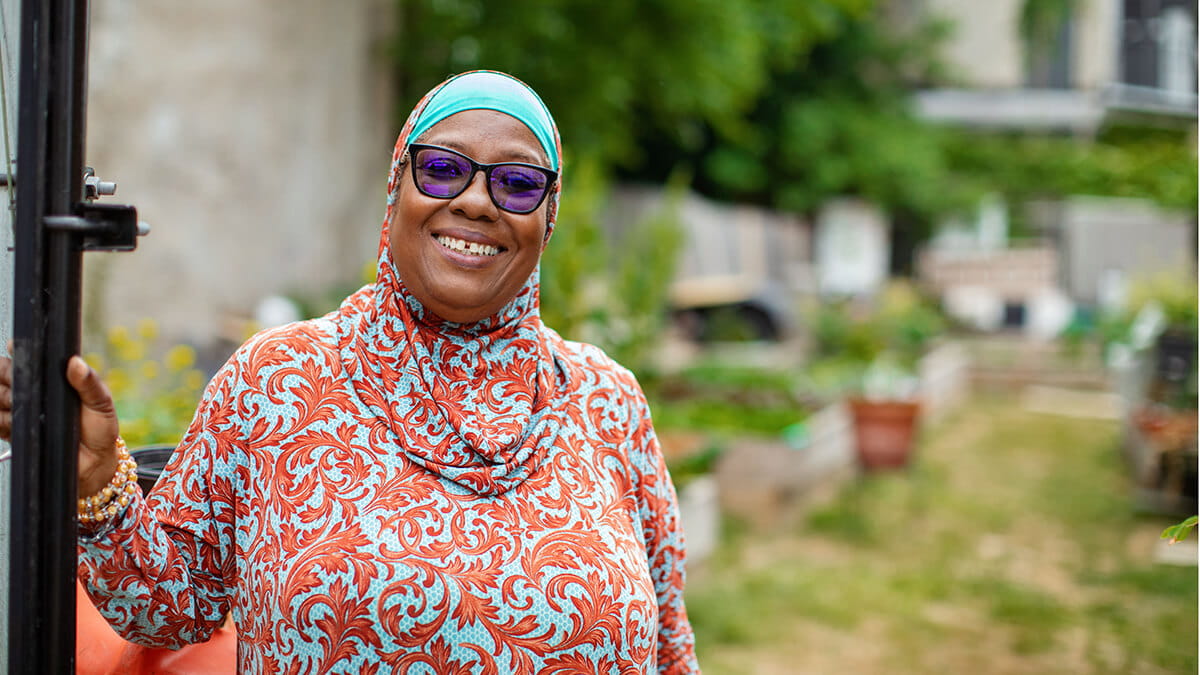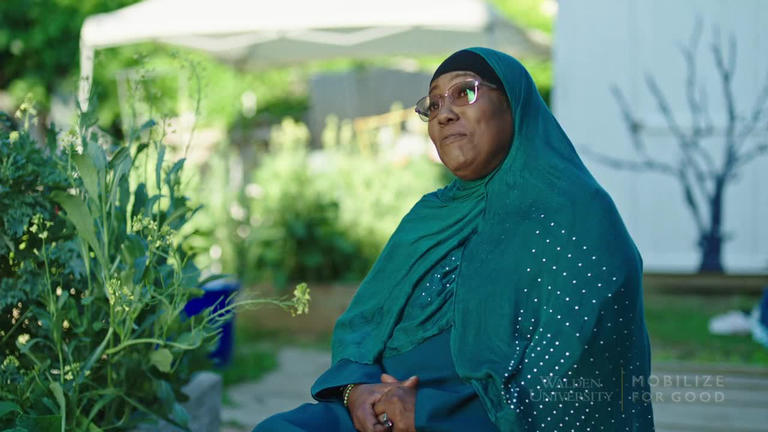“How are you doing? I’m good, I’m good.” Cecelia Rich is walking through the urban garden she founded in Wilmington, Delaware, greeting folks and inspecting the bounty rising from the soil. The romaine and red leaf lettuces are going gangbusters. The celery, too. “See how big they got?” she says.
She’s giving us a virtual tour of the garden, which is a project of The Village Tree, the nonprofit organization she established in 2016. Its mission? “Empowering communities by way of mind, body, and soul.” Growing fresh produce is part of the organization’s emphasis on building resiliency and reducing food insecurity. Rich, who is also The Village Tree’s CEO, and a corps of volunteers regularly distribute food from the garden, food banks, and other sources. On one day in April 2021, with the help of a variety of community partners, they served more than 3,800 meals in three hours. “Lately we’ve been using the word ‘underserved.’ Well, right now, I’m dealing with the unserved,” she says.
Addressing Inequities
In 2020, more than 10% of U.S. households were food insecure.1 Rich says she’s seen the problem worsen throughout the COVID-19 pandemic. “Those you wouldn’t expect to see at food banks are showing up at food banks. And what’s really interesting, what I’m noticing, is that while some people are just starting to talk about food insecurity, what I’m seeing is food apartheid. There are inequities of communities not having healthy, viable food. … We have to shine a light on that.”
Food insecurity was a focus of the thesis she wrote for the Master of Public Administration (MPA) degree she earned online from Walden University in 2017. “I did my thesis on social sustainability and food insecurity. So, I'm like, wait a minute: The common denominator is that we all have to eat to survive. … So, I figured, let me find the common denominator. Instead of looking at our differences, let me catch people and their similarities. We have the capability and opportunity to grow our own food. We don’t have to do it in a big field. We can do it in a pot. That’s when it started getting real for me.”
She pans her camera phone across the garden, pointing out a picnic table, a deck, and a volunteer-built shed. Almost everything is donated or made from donated materials. “It started with me. It’s slowly morphed into other people coming,” she says. The garden, which brings life to this once-vacant lot, is the “hook,” she explains. “If you feed them, they will come. But when they leave, they leave with so much more than the food.”
Growing a Social Change Mission
The Village Tree’s logo is the iconic African baobab tree. These massive trees “are designed to nurture a village,” Rich says. “The old African proverb was, it takes a village to raise a child. But now we have to shift, and we have to deal with the environment that we're living in. A lot of the children are having children, so it takes a village to raise a village.”
The baobab is symbolic in other ways, too. Its branches could represent the variety of services Rich sees stretching from the nonprofit’s core. “When people do come to the garden, it offers them the opportunity to think on a broader scale. And that's when questions are asked: Hey, do you know ...? Would you happen to have some information about …? Where can I go ...?”
And so, the organization helps connect people with community resources and hosts idea-sharing events to improve local sustainability. “When you're dealing with nonprofit organizations, what I've learned is that you have to have a specific audience base. And I did not want to count anyone out,” she says.
From Social Work to Public Policy
Rich brings 30-plus years of social work experience to managing a nonprofit organization. Yet, when she decided to earn a master’s degree, she chose public administration with a Nonprofit Management and Leadership specialization.
She explains, “One of the things that I did learn while I was in the social work field was that it was policies that changed the practice. If I wanted to see social change, it didn't start in the social work field. So, that's one of the reasons why I opted to go into public administration. And so, with this, maybe this is a platform to help me make some changes or at least rattle some chains for a change in policy.”
Rich is a chain-rattler and an expectation-defier. She calls herself a “diamond in the rough” and likens herself to Celie, The Color Purple’s protagonist, who said, “All my life I had to fight.” Because she has dyslexia, some educators dismissed her higher education goals. But not Walden University. “Walden told me that I could. And Walden gave me the tools to be able to be successful.”
Graduating with her MPA, Rich became the first person in her family to earn a master’s degree. She has three proud older brothers, she says.
Rich pauses the virtual tour. “Come on out tomorrow,” she calls to another community member. It’s Ramadan, and The Village Tree will host an iftar, a meal that breaks the daily fast. “It’s grab-and-go. We’re feeding the family,” she says. Her enthusiasm and warmth radiate from the screen.
“I’m not a United Way, I’m not a big name, I’m just a tree,” Rich says as she wraps up our tour. “And the beauty about a tree is that it has so many branches. And each branch has its purpose and serves its purpose each time. We need to know that we are branches. Each one of us has a gift. Find your gift. Find your niche and grow from it. And that’s what we try to do.”
Serve the Greater Good With an MPA Degree
Earning a master’s in public administration can provide the foundation for a career managing a nonprofit organization or for opportunities in arenas such as government, politics, health, public affairs, and business. Walden’s Master of Public Administration (MPA) degree program can help prepare you for public administration roles such as city manager, nonprofit executive, public health administrator, and human services agency manager, to name just a few.2
When you choose Walden for your online MPA degree, you can select a General Program of study or one of four optional specializations: Diversity and Social Justice, Emergency Management, Law and Public Policy, and Nonprofit Management and Leadership.
Walden’s online learning platform lets you earn an MPA degree online while you stay engaged in your career and enjoy your personal life. And as a working professional, you can apply what you’re learning in your current role. If your goal is to build a rewarding public administration career, let Walden help you become an agent of social change who creates innovative solutions to today’s challenges.
Walden University is an accredited institution offering an online Master of Public Administration (MPA) degree program with multiple specializations. Expand your career options and earn your degree in a convenient, flexible format that fits your busy life.
1Source: www.ers.usda.gov/topics/food-nutrition-assistance/food-security-in-the-us/key-statistics-graphics.aspx
2Career options may require additional experience, training, or other factors beyond the successful completion of this degree program.
Walden University is accredited by The Higher Learning Commission, www.hlcommission.org.





